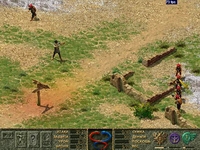| |
Site Navigation
Main
News
Forums
Games
Games Database
Top 100
Release List
Support Files
Features
Reviews
Previews
Interviews
Editorials
Diaries
Misc
Download
Gallery
Music
Screenshots
Videos
Miscellaneous
Staff Members
Privacy Statement
|
|
Vampire: The Masquerade - Bloodlines Review
Kristophe, 2005-01-25 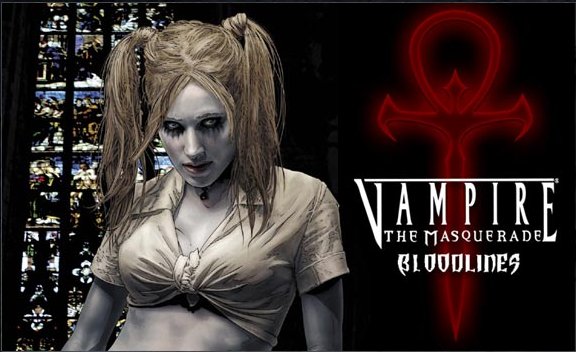
Vampire (or Wampyre, if that is your preference)!! Whether feared as rapacious denizens of the night - or seen as svelte, sensual creatures of a darkly erotic (albeit deadly) beauty; Vampires and their stories have been circulated around the world in every conceivable media form from the moment early mankind first learned to effectively communicate. In today's world, Vampires have managed to become a part of the lure and lore of the computer Role Playing Game - most notably in such RPG titles as Vampire the Masquerade: Redemption, and its newest sequel (and the main topic of this particular narrative), Vampire The Masquerade: Bloodlines - both titles derived from the "Masquerade" world of White Wolf's "Vampire". So let us now begin our journey of exploration, adventure, and intrigue as we explore this latest dark and surreal world of the urban Vampire - set in Los Angeles, California, in the present day and age.
The embrace
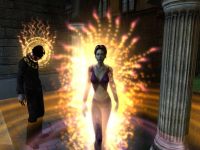 The game begins with your newly created character's flashback of events leading to the "Embrace" - the act of creation for a Vampire, in which your "Sire" (or creator) embraces you into the "Kindred" (the Vampire name for themselves) without permission from the local "Prince" (who happens to be Prince Sebastian LaCroix). Captured by the Prince's minions, your Sire is beheaded, while your character is allowed to live as a Vampire "Fledgling" (i.e. a newly created Vampire) after Nines Rodriguez, the de facto leader of the Anarch sect of LA., intervenes... The game begins with your newly created character's flashback of events leading to the "Embrace" - the act of creation for a Vampire, in which your "Sire" (or creator) embraces you into the "Kindred" (the Vampire name for themselves) without permission from the local "Prince" (who happens to be Prince Sebastian LaCroix). Captured by the Prince's minions, your Sire is beheaded, while your character is allowed to live as a Vampire "Fledgling" (i.e. a newly created Vampire) after Nines Rodriguez, the de facto leader of the Anarch sect of LA., intervenes...
"In the game, you will play a newley embraced Kindred - a Vampire who belongs to a centuries-old society that has hidden itself in the shadows of the night. As you learn to deal with your newfound supernatural powers, you'll encounter many mortals, and immortals that you didn't think could exist. Your survival as a new creature of the night depends on the allies and enemies you make through the course of your travels. Using your newfound vampiric powers (called Disciplines), feed on unsuspecting strangers and avoid enemies as you embark upon adventures in the night." *
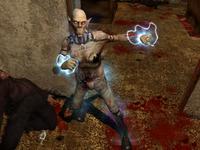 You begin your new life as a fledgling Kindred aligned with the Camarilla, seeing as how (prior to him/her losing his/her head) your Sire was a prominent member thereof. The Camarilla is but one of three Vampire sects (the other two being the evil Sabbat, and the anarchistic Anarchs), that believes in maintaining the Masquerade at all costs as being crucial to the continued existence of Kindred everywhere; they claim all Kindred as members, regardless of individual Kindred desires. Incidentally, the Masquerade is a code of conduct that expressly forbids Kindred to show or use their Disciplines in the presence of Kine (humans) for fear of inviting reprisals by humans - both Vampire hunters and law enforcement. Your character begins the game with five Masquerade points. Each Masquerade violation costs you one point - and you lose the game when you lose all of your points (though there are a few quests in game that will restore points). You begin your new life as a fledgling Kindred aligned with the Camarilla, seeing as how (prior to him/her losing his/her head) your Sire was a prominent member thereof. The Camarilla is but one of three Vampire sects (the other two being the evil Sabbat, and the anarchistic Anarchs), that believes in maintaining the Masquerade at all costs as being crucial to the continued existence of Kindred everywhere; they claim all Kindred as members, regardless of individual Kindred desires. Incidentally, the Masquerade is a code of conduct that expressly forbids Kindred to show or use their Disciplines in the presence of Kine (humans) for fear of inviting reprisals by humans - both Vampire hunters and law enforcement. Your character begins the game with five Masquerade points. Each Masquerade violation costs you one point - and you lose the game when you lose all of your points (though there are a few quests in game that will restore points).
Prince LaCroix takes you under his benevolent and protective wing (hah) before turning you loose to struggle your way through Santa Monica in his service (you do have the beginning game option in the form of a tutorial with the Anarch Kindred known as Jack, who will not only walk you through the basic VtM game play, but will also net you 2 XP, a set of lockpicks, and allow your character to start with a full blood bar for the actual game's beginning).
A word about Clans
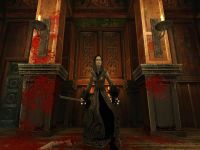 For the purpose of your character's creation at the game's start, a basic understanding of each one of the seven "Clans" you character can belong to should be noted (you can only belong to one Clan, btw): For the purpose of your character's creation at the game's start, a basic understanding of each one of the seven "Clans" you character can belong to should be noted (you can only belong to one Clan, btw):
- The Brujah Clan consists of those Kindred who are combat-oriented idealists fighting for a sort of Kindred utopia. They are naturally allied with the Anarchs, and make probably the best fighting Kindred of all the Clans.
- The Gangrel Clan consists of Kindred who are nomadic loners very closely attuned to animals. They are literally unarmed melee fighters who have the additional ability to take on various animal forms.
- The Malkavian Clan consists of almost wholly insane Kindred who live and interact in a world of their own. Their unique way of seeing the world, and their communication with other game NPCs, makes them a challenge.
- The Nosferatu Clan consists of the grotesque Kindred who live in the shadows and sewers of the world - their very appearance among Kine is an automatic Masquerade violation, thus making this Clan one of the hardest to play.
- The Toreador Clan consists of sensual Kindred who have managed to retain the closest ties to humanity. They tend to be the more diplomatic sort of RPG character, gaining and losing the most in "Humanity" points.
- The Tremere Clan consists of Kindred mages, whose study (and mastery) of Thaumaturgy makes them the only "magic users" in the game.
- The Ventrue Clan consists of those Kindred who are the closest thing to Vampire royalty, the enforcers of the Masquerade, and leaders of the Camarilla.
The nuts and bolts of VtM
 Character development in this game is unique in that there are no higher levels to attain, per se. Successfully completing quests, winning conflicts, performing certain actions - all gain your character experience that adds up to actual points you spend in the game to increase your character's Attributes, Abilities, and Disciplines - which, in turn increase your overall character's Feats, thus making your character more powerful as you progress through the game. The Clan you choose for your character also plays an important role - as each Clan starts with its own Disciplines, advantages, and disadvantages that directly affect the game play. This makes for a highly enjoyable (and unique) form of role playing - bearing in mind that if you are the sort of gamer to just skim over the game manual and then proceed to delve heavily into a game, you may not fare too well. That is why Troika provides a very well written, detailed game manual. Character development in this game is unique in that there are no higher levels to attain, per se. Successfully completing quests, winning conflicts, performing certain actions - all gain your character experience that adds up to actual points you spend in the game to increase your character's Attributes, Abilities, and Disciplines - which, in turn increase your overall character's Feats, thus making your character more powerful as you progress through the game. The Clan you choose for your character also plays an important role - as each Clan starts with its own Disciplines, advantages, and disadvantages that directly affect the game play. This makes for a highly enjoyable (and unique) form of role playing - bearing in mind that if you are the sort of gamer to just skim over the game manual and then proceed to delve heavily into a game, you may not fare too well. That is why Troika provides a very well written, detailed game manual.
Prior to the patch, VtM: Bloodlines did have some serious bugs that, more often than not, did cause more than a few gaming frustrations and crashes. Having installed the patch, and having played yet another complete game prior to writing this narrative, I am happy to report I encountered but an insignificant glitch or two only - and those mostly dealing with either some graphics, or some animations. On the reverse side of this coin, the patch effectively disables utilizing a gaming glitch that allowed you to build your character's Attributes, Abilities, and Disciplines up to their maximum during your initial character creation.
 All the game enhancing elements of a good RPG are present in this game (i.e. the character sheet, the character inventory sheet, HUD, the in game map, and the ease of game controls) - and due to the surreal (and often dark) game graphics, navigating around without the in game map and the helpful area transit maps would present a formidable challenge. As it is, once you've read (and understood) the game's manual - then both the character sheet, and the game's HUD become very clear and very useful tools with which to progress through the game. Gaming interface, movement, actions, etc., are all an easy "mouse and keyboard combo" that shouldn't hinder those of us who may be somewhat physically challenged. All the game enhancing elements of a good RPG are present in this game (i.e. the character sheet, the character inventory sheet, HUD, the in game map, and the ease of game controls) - and due to the surreal (and often dark) game graphics, navigating around without the in game map and the helpful area transit maps would present a formidable challenge. As it is, once you've read (and understood) the game's manual - then both the character sheet, and the game's HUD become very clear and very useful tools with which to progress through the game. Gaming interface, movement, actions, etc., are all an easy "mouse and keyboard combo" that shouldn't hinder those of us who may be somewhat physically challenged.
As a final note - while the game's character structure and development makes for highly interesting and individualized game play; it is in the way you chose to complete the quests that makes for the game's "replayability". For example (and without giving away too many secrets), the start of the "endgame" finds you meeting the Anarch Kindred Jack (from the start game's tutorial) who helps you escape a "Blood Hunt" that Prince LaCroix has called forth in a double-cross attempt to eliminate your character by "hooking you up" with a mysterious cabdriver (very unlike the normal game cabdrivers). Instead of going to a specified destination, you converse with this NPC, thereby deciding which of the various game endings you may receive which (in turn), your previous game actions throughout the game up to this point determine which game endings will be available to you.
To conclude the Masquerade
 All in all, I found Vampire the Masquerade: Bloodlines to be a definite and welcomed addition to any Role Playing Game inventory. Character creation, development, progression all handled well within the game's structure - yet there was enough variety to satisfy almost any individual's style of game play. The game's soundtrack was very good - though I personally preferred the game's radio and television broadcasts, advertisements, and late night host to the actual game music. The games AI was challenging, yet not overwhelming - though I did save, and save often in order to complete any given game. The storyline was unique, and game play did follow the storyline faithfully - even though it also allowed for a great variety in game choices, game play, and in the game's ending. The game's voice acting was excellent - one rarely finds that sort of quality; and I was surprised at the depth of facial expression each NPC was able to display. All in all, I found Vampire the Masquerade: Bloodlines to be a definite and welcomed addition to any Role Playing Game inventory. Character creation, development, progression all handled well within the game's structure - yet there was enough variety to satisfy almost any individual's style of game play. The game's soundtrack was very good - though I personally preferred the game's radio and television broadcasts, advertisements, and late night host to the actual game music. The games AI was challenging, yet not overwhelming - though I did save, and save often in order to complete any given game. The storyline was unique, and game play did follow the storyline faithfully - even though it also allowed for a great variety in game choices, game play, and in the game's ending. The game's voice acting was excellent - one rarely finds that sort of quality; and I was surprised at the depth of facial expression each NPC was able to display.
On the negative side of things - I was highly disappointed with the game's stilted, often poor graphics - especially as this game was made with the same Source game engine that Half Life 2 is powered on. Many of the game's animations seemed (altogether) totally erratic and out of place with the setting; images (and game characters) seemed to float in, out, and through various game backdrop settings, and the all too often poor lip synchronization to the excellent voice acting detracted from my own, gaming pleasure. Character movement (be it PC or NPC) was often jerky and unreal - unlike the svelte, slinky sort of movement one would expect a Vampire to have. And game control, while good throughout most of the game, was not the easiest to handle during game combat - with ranged attacks being the worst to handle.
In concluding this review - I've always gone by a very simple mode in determining just how enjoyable (or lack thereof) any particular game is. If I find myself unable to complete a game, then that would be a game I would hardly qualify as "Fun" in any sense of the word; if I play a game through to completion only once - then I'd categorize such a game as "Borderline Fun"; if I play a game through to completion two or more times (and then shelve it for playing on some future date) - then I'd declare that game to definitely fit the definition of "Fun". That being said, I had just completed my third Vampire the Masquerade: Bloodlines game before sitting down to pen this review.
- * VtM: Bloodlines Game Manual - page 3
|
The Verdict
|
Graphics (15%) |
75% |
|
|
Sound (15%) |
85% |
|
Control (25%) |
80% |
|
Fun (45%) |
89% |
|
Overall
|
84%
|
|
The ups and downs:
| Character Creation | Game Graphics | | Character Development | Poor Lip Synch | | Quest Variety | Erratic Animation | | Excellent Storyline | Combat Control | | Definite Replayability | |
|
Reviewer's System
|
Version: |
1.2 |
|
CPU: |
AMD XP 3200+ |
|
RAM: |
2048MB |
|
Graphics |
MSI nvidia GeForce FX 5950 |
|
Sound |
SB Audigy 2 ZS Platinum |
|
OS: |
Windows XP Pro, SP2 |
|
Average Reader Ratings: 8.06 (78 votes) Rate this title and view comments Game Info Printer Friendly Version |
|




